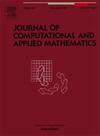Robust selection and estimation for sparse multivariate functional nonparametric additive models via regularized Huber regression
IF 2.6
2区 数学
Q1 MATHEMATICS, APPLIED
Journal of Computational and Applied Mathematics
Pub Date : 2025-09-26
DOI:10.1016/j.cam.2025.117104
引用次数: 0
Abstract
In this paper, we investigate sparse functional additive models with multivariate functional predictors and a scalar response variable. This model adopts a nonparametric additive framework to flexibly incorporate multivariate functional principal component analysis (FPCA) scores, effectively capturing complex nonlinear relationships while mitigating the curse of dimensionality. To enhance robustness against outliers and heavy-tailed errors, we propose a regularized Huber regression method incorporating the component selection and smoothing operator (COSSO) penalty. The proposed approach is formulated within a reproducing kernel Hilbert space (RKHS) framework, enabling simultaneous component selection and estimation in a robust manner. Furthermore, we extend the locally adaptive majorize-minimization (LAMM) principle to develop a general iterative optimization algorithm applicable to any loss function with continuous gradients. Under mild assumptions on the error distribution (without requiring sub-Gaussian tails) and standard regularity conditions, we establish theoretical guarantees for the proposed estimator. Extensive simulation studies and a real data application to fluorescence spectroscopy demonstrate the superior performance of our method compared to existing alternatives.
稀疏多元泛函非参数加性模型的正则化Huber回归鲁棒选择与估计
本文研究了具有多元泛函预测变量和标量响应变量的稀疏泛函加性模型。该模型采用非参数加性框架,灵活融入多元功能主成分分析(FPCA)分数,有效捕捉复杂的非线性关系,减轻了维数诅咒。为了增强对异常值和重尾误差的鲁棒性,我们提出了一种包含分量选择和平滑算子(COSSO)惩罚的正则化Huber回归方法。所提出的方法是在一个再现核希尔伯特空间(RKHS)框架内制定的,能够以鲁棒的方式同时进行组件选择和估计。在此基础上,进一步扩展了局部自适应极大极小化(LAMM)原理,提出了一种适用于任何具有连续梯度的损失函数的通用迭代优化算法。在对误差分布的温和假设(不需要亚高斯尾)和标准正则性条件下,我们为所提出的估计量建立了理论保证。广泛的模拟研究和荧光光谱的实际数据应用表明,与现有的替代方法相比,我们的方法具有优越的性能。
本文章由计算机程序翻译,如有差异,请以英文原文为准。
求助全文
约1分钟内获得全文
求助全文
来源期刊
CiteScore
5.40
自引率
4.20%
发文量
437
审稿时长
3.0 months
期刊介绍:
The Journal of Computational and Applied Mathematics publishes original papers of high scientific value in all areas of computational and applied mathematics. The main interest of the Journal is in papers that describe and analyze new computational techniques for solving scientific or engineering problems. Also the improved analysis, including the effectiveness and applicability, of existing methods and algorithms is of importance. The computational efficiency (e.g. the convergence, stability, accuracy, ...) should be proved and illustrated by nontrivial numerical examples. Papers describing only variants of existing methods, without adding significant new computational properties are not of interest.
The audience consists of: applied mathematicians, numerical analysts, computational scientists and engineers.

 求助内容:
求助内容: 应助结果提醒方式:
应助结果提醒方式:


